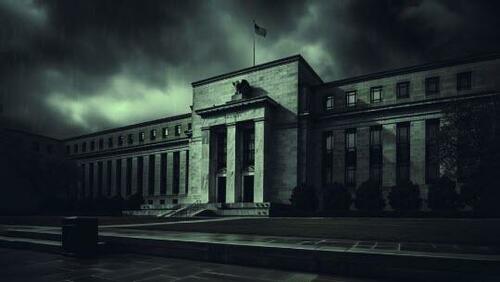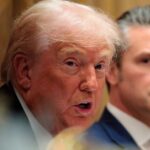
The Federal Reserve operates under a dual mandate from Congress - to achieve maximum employment and stable prices. In a recent podcast, Peter Schiff explained why the Fed won’t achieve either.
The FOMC held its November meeting last week. As expected, the Fed left interest rates unchanged. Peter said you can almost always count on the central bank to do what is expected.
The Fed never wants to confound expectations. They never want to surprise the markets. So, if the markets expect no rate hike, well, they deliver no rate hike, and that’s what happened.”
During his prepared remarks, Federal Reserve Chairman Jerome Powell acknowledged the “economic hardship” caused by price inflation. But Peter said he doesn’t seem to grasp the full picture.
Since inflation is caused by the government, and caused by the Federal Reserve, it’s the government and the Fed that are creating that hardship. It’s not like it’s just happening out of left field.”
It’s an intentional policy. The government has decided that it will pay for its borrowing and spending through an inflation tax.
Now, had they used another form of taxation, had the Biden administration, and the Trump administration for that matter, had they raised taxes enough to pay for all of these government programs, that would have created hardship too. Families would be struggling under the burden of crushing taxation. So because the government decided to tax them through inflation as opposed to through the income tax or the payroll tax, the hardship that is being created is because of government. It’s not just something that’s happening by happenstance.”
Powell also reiterated that the goal is “price stability.” Nobody ever bothers to ask, “Why?” What’s so good about price stability?
What about lower prices? Because price stability, the way a normal person would define it, is prices stay the same. Well, I’m a consumer. I’d rather have prices go down than prices remain the same. So, what if prices went down 1% a year, or 2% a year? Why is that so bad? Why does the Fed have to replace that with stability?”
Peter said we don’t really need “price stability.”
It’s really a BS goal.”
And we don’t even actually have a goal of price stability. The goal is for prices to go up 2%.
There’s nothing stable about that other than the rate of increase.”
After the Fed meeting, Powell admitted the central bank isn’t anywhere near that goal and that this is a long process.
He’s underestimating. Waiting for inflation to go to 2% is going to be like waiting for Godot. It’s never going to happen.”
During the Q&A, Powell emphasized that we have a “very strong” economy. Just two days later, we got a very weak jobs report. (Peter talked about this earlier in the podcast.)
How is the economy so strong if the labor market is that weak? … I don’t know what Powell is looking at. I think he’s just reading a script that the Biden administration handed him because he’s just reiterating their talking points to talk up the economy so Biden can get credit for it.”
The question is how will Powell respond when the labor market continues to deteriorate? That would imply the Fed should stop hiking. But as Peter pointed out, one of the reasons the labor market is weakening is because price inflation is strengthening. How can he focus on a weakening labor market and ignore strengthening inflation?
Meanwhile, Powell continued to insist that we need to see a slowdown in economic growth and some “dampening” in the labor market in order to “fully restore price stability.” In other words, he wants to see more people lose their jobs. That’s because he thinks people are spending because they are doing well, that spending is creating more jobs, and also pushing wages higher. Peter said people are spending more because prices are going up.
They’re spending because the money supply has gone up. They’ve got more money to spend, and they’re spending because they’re still able to access credit. They’re taking that borrowed money and spending it. This is not how you grow an economy. This is how you destroy an economy. This is not a virtuous dynamic that he is describing. It is a vicious one that is going to end in ruin. Because you don’t grow an economy by people spending money.”
You grow an economy by not spending money and saving. That provides seed corn for capital investment. That increases productivity creating more output.
You produce your way to prosperity. You save your way, and then invest and produce your way into prosperity. We’re not doing that. We’re trying to put the cart before the horse.”
Peter reiterated that we don’t have a strong economy. We have an inflationary economy.
It’s inflation that is driving everything. Powell just doesn’t realize that. He’s looking at the ‘strong’ economy, and he’s thinking everything is good. He’s looking at inflation. He just doesn’t understand that.”
Peter said he doesn’t think there are any more rabbits the central bankers can pull out of their hats or any road left where they can kick the can. The economy is about to implode and inflation is alive and well. That means the Fed can chuck both its mandates right out the window.
The Federal Reserve operates under a dual mandate from Congress – to achieve maximum employment and stable prices. In a recent podcast, Peter Schiff explained why the Fed won’t achieve either.
The FOMC held its November meeting last week. As expected, the Fed left interest rates unchanged. Peter said you can almost always count on the central bank to do what is expected.
The Fed never wants to confound expectations. They never want to surprise the markets. So, if the markets expect no rate hike, well, they deliver no rate hike, and that’s what happened.”
[embedded content]
During his prepared remarks, Federal Reserve Chairman Jerome Powell acknowledged the “economic hardship” caused by price inflation. But Peter said he doesn’t seem to grasp the full picture.
Since inflation is caused by the government, and caused by the Federal Reserve, it’s the government and the Fed that are creating that hardship. It’s not like it’s just happening out of left field.”
It’s an intentional policy. The government has decided that it will pay for its borrowing and spending through an inflation tax.
Now, had they used another form of taxation, had the Biden administration, and the Trump administration for that matter, had they raised taxes enough to pay for all of these government programs, that would have created hardship too. Families would be struggling under the burden of crushing taxation. So because the government decided to tax them through inflation as opposed to through the income tax or the payroll tax, the hardship that is being created is because of government. It’s not just something that’s happening by happenstance.”
Powell also reiterated that the goal is “price stability.” Nobody ever bothers to ask, “Why?” What’s so good about price stability?
What about lower prices? Because price stability, the way a normal person would define it, is prices stay the same. Well, I’m a consumer. I’d rather have prices go down than prices remain the same. So, what if prices went down 1% a year, or 2% a year? Why is that so bad? Why does the Fed have to replace that with stability?”
Peter said we don’t really need “price stability.”
It’s really a BS goal.”
And we don’t even actually have a goal of price stability. The goal is for prices to go up 2%.
There’s nothing stable about that other than the rate of increase.”
After the Fed meeting, Powell admitted the central bank isn’t anywhere near that goal and that this is a long process.
He’s underestimating. Waiting for inflation to go to 2% is going to be like waiting for Godot. It’s never going to happen.”
During the Q&A, Powell emphasized that we have a “very strong” economy. Just two days later, we got a very weak jobs report. (Peter talked about this earlier in the podcast.)
How is the economy so strong if the labor market is that weak? … I don’t know what Powell is looking at. I think he’s just reading a script that the Biden administration handed him because he’s just reiterating their talking points to talk up the economy so Biden can get credit for it.”
The question is how will Powell respond when the labor market continues to deteriorate? That would imply the Fed should stop hiking. But as Peter pointed out, one of the reasons the labor market is weakening is because price inflation is strengthening. How can he focus on a weakening labor market and ignore strengthening inflation?
Meanwhile, Powell continued to insist that we need to see a slowdown in economic growth and some “dampening” in the labor market in order to “fully restore price stability.” In other words, he wants to see more people lose their jobs. That’s because he thinks people are spending because they are doing well, that spending is creating more jobs, and also pushing wages higher. Peter said people are spending more because prices are going up.
They’re spending because the money supply has gone up. They’ve got more money to spend, and they’re spending because they’re still able to access credit. They’re taking that borrowed money and spending it. This is not how you grow an economy. This is how you destroy an economy. This is not a virtuous dynamic that he is describing. It is a vicious one that is going to end in ruin. Because you don’t grow an economy by people spending money.”
You grow an economy by not spending money and saving. That provides seed corn for capital investment. That increases productivity creating more output.
You produce your way to prosperity. You save your way, and then invest and produce your way into prosperity. We’re not doing that. We’re trying to put the cart before the horse.”
Peter reiterated that we don’t have a strong economy. We have an inflationary economy.
It’s inflation that is driving everything. Powell just doesn’t realize that. He’s looking at the ‘strong’ economy, and he’s thinking everything is good. He’s looking at inflation. He just doesn’t understand that.”
Peter said he doesn’t think there are any more rabbits the central bankers can pull out of their hats or any road left where they can kick the can. The economy is about to implode and inflation is alive and well. That means the Fed can chuck both its mandates right out the window.
Loading…





